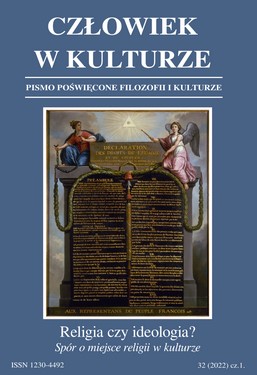Mitologizacja moralności w posthumanistycznej etyce
The mythologisation of morality in posthumanist ethics
Author(s): Marek CzachorowskiSubject(s): Christian Theology and Religion, Ethics / Practical Philosophy, Contemporary Philosophy, Philosophy of Religion
Published by: Fundacja »Lubelska Szkoła Filozofii Chrześcijańskiej«
Keywords: ethics; mythologization; posthumanism; postmodernism; Heidegger; Foucault; Bauman; Rorty; Habermas; neuroethics;
Summary/Abstract: This article presents the irrationalisation of the field of morality in the mainstream of contemporary ethics, which is commonly referred to as "posthumanism". It has three varieties, with a common denominator, which is the direct or indirect questioning of the classical concept of man - and classical ethics based on it - as a rational being, directing his will in his actions on the basis of the recognition of truth by reason. Representatives of postmodern ethics (R. Rorty, Z. Bauman) ascribe to reason only a servile position in relation to man's orientation towards pleasure (consumption), but within the framework of this free self-creation they usually postulate a reasonable subordination of consumption to the prevailing rules of social life. Representatives of <discursive> ethics (J. Habermas), on the other hand, deny the task of practical reason to read the objective truth about the good in reality, but assign it the task of eliminating moral conflicts of self-creation. In turn, representatives of neuro-ethics (P. Churchland) by excluding human freedom also question the normative role of human reason. The application to Christian religious life of any current of posthumanist ethics transforms Christianity into another mythology, as John Paul II has already warned.
Journal: Człowiek w Kulturze
- Issue Year: 2022
- Issue No: 32
- Page Range: 89-117
- Page Count: 29
- Language: Polish

